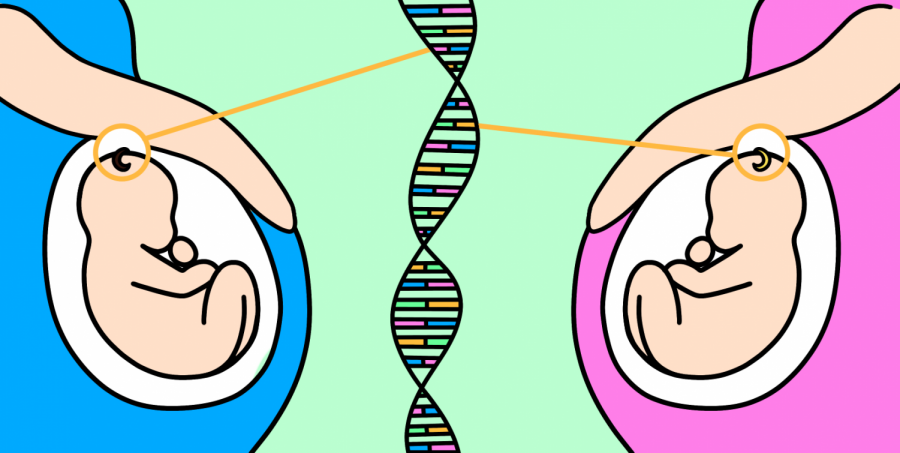Designer babies: want one?
Genetic engineering, or the manipulation of genes for desirable traits, could soon become one of the greatest achievements of all time. But will it divide our society further?
Genetic engineering is the future of our society, and it’s not a good thing.
September 17, 2021
Of all the greatest scientific achievements in the history of mankind, genetic engineering in humans may be the most remarkable and exceptional. Imagine being able to “design” your future child, choosing their major traits like height, hair and eye color, athleticism, and even intelligence.
Genetic engineering is the process of modifying a human’s genome, the complete DNA set, of an organism. The process, among other things, could allow scientists to manipulate specific genes in order to avoid undesirable traits and add desirable ones.
Ever since genetic engineering debuted in the 1970s, there has been a high level of controversy on whether or not it should be permitted due to ethical and societal reasons.
By implementing this new invention in society, parents would be able to make decisions and choices that would directly impact their child’s future. They could choose to alter major characteristics, and additionally parents could select to eliminate genes that cause diseases or handicaps.
One major question would be: Is this happening today? Are people literally picking eye colors and other traits for there children right now? The answer is… Not quite yet, but there have been examples of genetic engineering in the medial world.
In 2018, twin girls were born in Shenzhen, China. The scientists in this case altered the twins’ genomes when they were embryos in order “to disrupt a gene that codes for a protein,” which made them less susceptible to various diseases.
But some day soon, there will come a time when genetic engineering takes the next step. In 1997, one can find, the film Gattaca explored what a world with this capability could look like.
In the film, starring Ethan Hawke, parents were able to design their child to be the “perfect” or “more perfect” humans. The main character, Vincent (Ethan Hawke), was born naturally, while his younger brother Anton was created through gene manipulation, allowing him to be taller, stronger, and more intelligent. Anton was born into a whole world of opportunities not available to Vincent. The movie showed how this dynamic could create great social tension and inequality, with one group becoming superior to another other.
In 2011, NASA named the film the best scientific fiction movie of all time. In other words, it could happen.
One strong argument for genetic engineering is that the capability could help prevent diseases, such as cystic fibrosis, sickle cell disease, and potentially cancer and heart diseases.
If given the chance, what parent wouldn’t want to save their impending child from a potentially fatal diagnosis? And what’s more, wouldn’t you make them smarter, taller, more beautiful? Well, not so fast. In more recent years, there has been widespread criticism of the possibilities that has left many hesitant about the potential effects of the new discovery.
A study by Pew Research Center found that approximately 48% of parents would consider genetic alteration, while just over half asserted that there was no way. The study concludes that around 68% of adults in the United States are either “very” or “somewhat” worried when it comes to the prospect of genetic engineering.
A survey conducted asked respondents how they believed genetic engineering would affect society if it became widely available. Overall, only 17% of respondents believed it would have no impact on society. 70%, though, reported that they believe it would result in class discrimination or inequality between the genetically modified and those who were not.
One of the biggest reasons for the effect of inequality is the cost. It could cost $20,000 or more to make even the genetic smallest modification. As a result, only people with the resources would be able to participate.
There’s also the question of discrimination. If there came a point where the majority of people were being genetically engineered, there could potentially be a social divide between those who are not. Many might argue that those who are genetically modified would be far more successful, leading to issues of fairness.
Although genetic engineering is a huge breakthrough, in my view, the negatives outweighs the positives. It’s been a tough couple of years to be sure, but is it really worth dividing our society further?




























































Caroline Pope • Feb 3, 2022 at 2:40 pm
Helloooooo,
where can i obtain one!
—–love
caroline
ps.
fabulos story mademoiselle